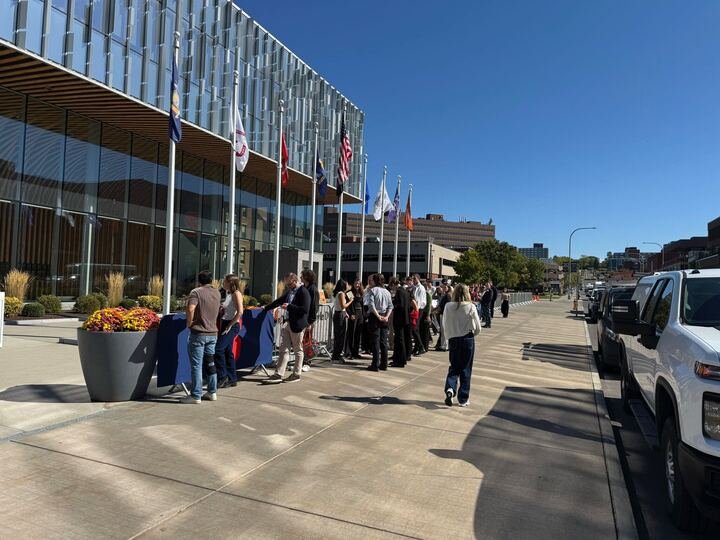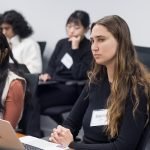Get the latest Syracuse news delivered right to your inbox.
Subscribe to our newsletter here.
Former United States Secretary of Transportation Pete Buttigieg visited Syracuse University for a student-centered discussion on the next steps for American politics. He spoke on the important role young people play in shaping the nation, touching on polarization, the rise of artificial intelligence and climate change policy.
Buttigieg, who served four years under Joe Biden’s administration, was welcomed to SU with a sold-out crowd. Students, university administrators including Provost and Vice Chancellor Lois Agnew and Syracuse city leaders Mayor Ben Walsh and mayoral candidate Sharon Owens made up the auditorium.
The Friday event, part of the Pontarelli Speaker Series, was held at the National Veterans Resource Center’s K.G. Tan Auditorium. The Maxwell School of Citizenship and Public Affairs and the Martin J. Whitman School of Business co-sponsored the talk.
Maxwell Dean David Van Slyke opened the event, describing it as a reflection of student interests, saying undergraduates and graduate students “overwhelmingly” requested Buttigieg.
Jay Golden, SU’s Pontarelli Professor of Environmental Sustainability and Finance, moderated the discussion, asking Buttigieg a variety of questions, with a few coming from SU students in the audience. Golden said tickets to the event sold out in around 20 minutes.
Golden began the conversation with a broad question: “Where are we as a nation?”
Buttigieg said he’s been asking himself similar questions. There are many unknowns in democracy today, he said, and the nation is in a “precarious” time to put it “diplomatically.”
“We’re living in times so bad, they might actually be honored by a future generation provided that we get through this moment in one piece,” Buttigieg said.
Buttigieg, who previously served as the youngest mayor of South Bend, Indiana, drew comparisons between his Indiana hometown and Syracuse. Both cities are considered college towns, but don’t necessarily have the infrastructure of some wealthier cities.
When asked about the growing shift toward right-wing politics, Buttigieg said he doesn’t fully believe the country is “drifting” toward the right and discussed the importance of understanding polarization.
While working in the White House, Buttigieg said members of his party would question when he went on networks such as Fox News because of its political leanings. Buttigieg said he believes that in order to spread information well, he needed to access different groups of people.
He asked anyone under the age of 25 in the audience to raise their hands if they get their news from television. After only a few hands went up, he challenged the audience to reconsider how they consume media, saying more and more people rely on online sources such as TikTok and Instagram, which are curated, algorithm-driven feeds.
A student asked about funding cuts to universities under President Donald Trump’s administration and its impacts. Buttigieg said while universities will always have power, many are in a difficult position right now, actively trying to comply with federal regulations to keep their funding.
He said many universities are being attacked because of their independence and their ability to teach and grow different ideologies. Buttigieg said universities have an important role in hiring faculty who will “politically challenge the government.”
“The job of the university is not to conform to the ideology of the government,” Buttigieg said. “The job of the university is to foster the kind of free inquiry that leads to breakthroughs.”
Golden also asked questions regarding what Congress will do to help with these issues. Buttigieg joked in response, saying, “Congress is out to lunch right now,” in reference to Wednesday’s government shutdown.
On the impacts of AI and its growing importance, Buttigieg said it’s becoming a skill that everyone needs to learn. He stressed the importance of being “literate in AI technology.”
AI is very different in technology than it is in politics, he said, but is impacting both. Buttigieg noted that AI will become not just a tool but a “competency” that everyone must have in the workforce, as white-collar jobs become more vulnerable to AI.
The conversation shifted focus to environmental policies, growing concerns over climate change and funding cuts to the Environmental Protection Agency. Buttigieg was asked if he feels the American people should have faith that the Supreme Court of the United States will protect environmental rights if they’re questioned.
Buttigieg said he “doesn’t expect much” from the courts currently, and instead, reflected on his time as mayor of South Bend. He said there, he truly realized the importance of environmental policies.
He recalled checking on residents around the city after a large storm hit South Bend. Buttigieg said he went into one woman’s house in a low-income neighborhood and saw all of her possessions floating in her living room because of the flooding.
After she told him she couldn’t afford to replace her belongings, he said he realized how important creating policy for climate change was. The local issue, affecting people in his community, amplified the seriousness and harsh reality that it doesn’t just impact “polar bears somewhere far off in the Arctic,” he said.
Buttigieg gave advice to students in the audience, saying young people are the hope of the future. He said when he was campaigning for mayor, older people valued that he was a young candidate because it showed them that the new generation truly cared about the country’s future.
He told students not to underestimate their “moral authority” and to continue influencing policy and creating meaningful change. Buttigieg said it’s very easy to want to ignore the political climate and understands the “temptation to check out” of politics. However, he stressed that young people are the future.
“I wouldn’t be doing what I do unless I had hope for the future,” Buttigieg said. “We don’t have the luxury of pessimism or cynicism.”











